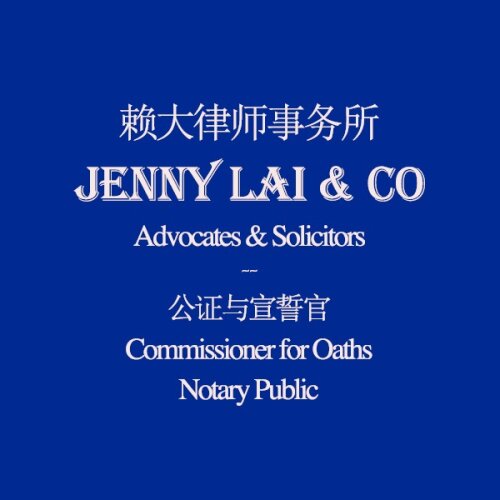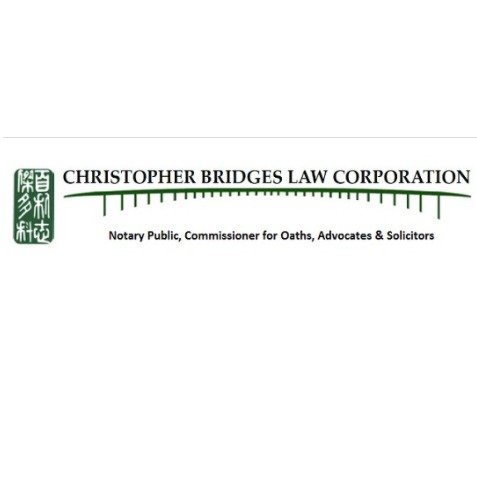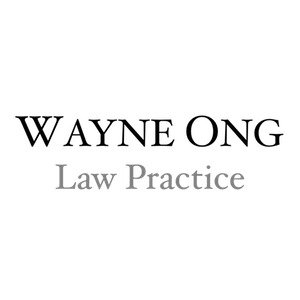Best Natural Resources Lawyers in Singapore
Share your needs with us, get contacted by law firms.
Free. Takes 2 min.
Or refine your search by selecting a city:
List of the best lawyers in Singapore
About Natural Resources Law in Singapore
Natural resources law in Singapore encompasses the legislation and policies governing the use and management of the country's natural resources, which include water, energy, minerals, and land. Given Singapore's small size and limited natural resources, resource management is crucial for sustainable development. The country relies heavily on efficient resource management and conservation strategies to meet its needs and ensure environmental sustainability.
Why You May Need a Lawyer
There are various situations in which individuals or organizations might require legal assistance concerning natural resources in Singapore. These include navigating the regulatory landscape for businesses interested in resource extraction or management, dealing with environmental impact assessments for developmental projects, ensuring compliance with resource-related regulations, addressing disputes over land use or resource allocation, and understanding and applying for licenses needed for resource-related activities.
Local Laws Overview
Singapore's legal framework for natural resources is characterized by comprehensive regulations that address conservation and sustainable use. Key aspects include:
Environmental Protection and Management Act (EPMA): This act regulates pollution control and environmental protection.
Water policies: Managed by the Public Utilities Board (PUB), various policies ensure efficient water use and management, including the protection of water resources and encouragement of water conservation.
Energy regulations: These cover energy conservation and efficient usage, overseen by the Energy Market Authority (EMA).
Land and forest management: Administered by the National Parks Board (NParks) and other related bodies, regulations in this area focus on sustainable land use and preservation of biodiversity.
Adherence to these laws is crucial for compliance and ensuring resource sustainability in Singapore.
Frequently Asked Questions
What are the primary authorities governing natural resources in Singapore?
The primary authorities include the National Environment Agency (NEA), the Energy Market Authority (EMA), the Public Utilities Board (PUB), and the National Parks Board (NParks).
Do I need a license to start a business related to natural resources?
Yes, certain activities involving natural resources often require licenses or permits, depending on the scope and nature of the business.
What are the penalties for non-compliance with natural resource laws?
Penalties can range from fines, permit revocation, or even legal action depending on the severity of the non-compliance.
How can I ensure compliance with environmental laws for my project?
Engage with environmental consultants and legal professionals to conduct Environmental Impact Assessments (EIA) and ensure thorough compliance with all relevant regulations.
How are water resources managed in Singapore?
Water resources are managed by the PUB, focusing on water sustainability through strategies like water recycling, desalination, and importation.
What resources are available to help understand the legislative framework?
The websites of the respective authorities like NEA, EMA, and PUB offer detailed information and resources regarding regulations and guidelines.
What is the process for resolving disputes over natural resource usage?
Dispute resolution may involve negotiation, mediation, or legal proceedings, and it is often advisable to seek legal assistance for such matters.
Are there incentives for using renewable energy sources?
The government provides several incentives to encourage businesses and individuals to adopt renewable energy sources and increase energy efficiency.
Does Singapore engage in international partnerships for resource management?
Yes, Singapore often collaborates with regional and international partners for sustainable resource management and environmental conservation efforts.
Can individuals make contributions to natural resource conservation?
Individuals can contribute through personal conservation efforts, recycling, and participation in community programs aimed at conserving natural resources.
Additional Resources
For further assistance and information, consider reaching out to the following organizations:
Ministry of Sustainability and the Environment (MSE): Responsible for the formulation of national policies concerning sustainable development.
National Environment Agency (NEA): Focuses on environmental and public health issues in Singapore.
Energy Market Authority (EMA): Oversees the reliable and secure supply of energy.
Public Utilities Board (PUB): Singapore’s National Water Agency manages water supply, water catchment, and used water.
National Parks Board (NParks): Manages Singapore's urban greenery and various species conservation programs.
Next Steps
If you require legal assistance with natural resources in Singapore, consider taking the following steps:
1. Identify the specific area of law or issue needing attention.
2. Conduct preliminary research to understand the basics of your situation.
3. Seek recommendations for reputable law firms or legal professionals specializing in natural resources.
4. Schedule consultations to discuss your case and evaluate potential legal paths.
5. Engage legal assistance based on experience, expertise, and a clear communication plan to address your needs effectively.
Lawzana helps you find the best lawyers and law firms in Singapore through a curated and pre-screened list of qualified legal professionals. Our platform offers rankings and detailed profiles of attorneys and law firms, allowing you to compare based on practice areas, including Natural Resources, experience, and client feedback.
Each profile includes a description of the firm's areas of practice, client reviews, team members and partners, year of establishment, spoken languages, office locations, contact information, social media presence, and any published articles or resources. Most firms on our platform speak English and are experienced in both local and international legal matters.
Get a quote from top-rated law firms in Singapore — quickly, securely, and without unnecessary hassle.
Disclaimer:
The information provided on this page is for general informational purposes only and does not constitute legal advice. While we strive to ensure the accuracy and relevance of the content, legal information may change over time, and interpretations of the law can vary. You should always consult with a qualified legal professional for advice specific to your situation.
We disclaim all liability for actions taken or not taken based on the content of this page. If you believe any information is incorrect or outdated, please contact us, and we will review and update it where appropriate.
Browse natural resources law firms by city in Singapore
Refine your search by selecting a city.















